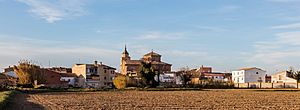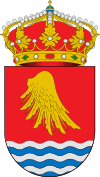Plasencia de Jalón facts for kids
Quick facts for kids
Plasencia de Jalón, Spain
|
|||
|---|---|---|---|
 |
|||
|
|||
| Country | Spain | ||
| Autonomous community | Aragon | ||
| Province | Zaragoza | ||
| Municipality | Plasencia de Jalón | ||
| Area | |||
| • Total | 34 km2 (13 sq mi) | ||
| Elevation | 274 m (899 ft) | ||
| Population
(2018)
|
|||
| • Total | 303 | ||
| • Density | 8.91/km2 (23.1/sq mi) | ||
| Time zone | UTC+1 (CET) | ||
| • Summer (DST) | UTC+2 (CEST) | ||
Plasencia de Jalón is a small town, also known as a municipality, located in Spain. It is found in the province of Zaragoza, which is part of the Aragon region. In 2018, about 303 people lived there. This makes it a quiet place, perfect for exploring Spanish culture.
Contents
Discovering Plasencia de Jalón
Plasencia de Jalón is a charming municipality in northeastern Spain. It covers an area of about 34 square kilometers. The town sits at an elevation of 274 meters above sea level. This means it's not too high up, offering pleasant views of the surrounding area.
Where is Plasencia de Jalón?
This town is in the province of Zaragoza. Zaragoza is one of the three provinces in the Aragon region. Aragon is an autonomous community in Spain. An autonomous community is like a large state or region with its own government.
What is a Municipality?
A municipality is a local government area. It usually includes a town or city and its surrounding rural areas. Plasencia de Jalón is one such municipality. It has its own local council that helps manage the town. This council makes decisions for the people living there.
Population and Life in Plasencia
The number of people living in Plasencia de Jalón has changed over time. In 2004, the population was 368. By 2018, it was 303 people. This shows it is a small community. People often know each other well in such places. Life here might be peaceful and connected to nature.
Daily Life in the Town
In a small town like Plasencia de Jalón, daily life is often calm. Residents might work in farming or local services. The community likely has strong traditions. Many small Spanish towns celebrate local festivals. These festivals often include music, dancing, and traditional food.
See also
 In Spanish: Plasencia de Jalón para niños
In Spanish: Plasencia de Jalón para niños



